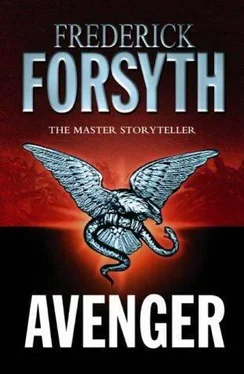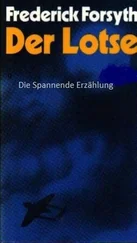"No women, no children?"
"None. They are not here to breed. But there is a church. The priest preaches one text only-absolute obedience." He forbore to mention that for lack of obedience he retained the use of his rhino-hide *sjambok* whip as in the old days.
"Could a stranger come into the estate posing as part of the workforce, Major?"
"No. Every evening the workforce for the next day is selected by the estate manager who goes to the village. Those selected walk to the main gate and report at sunrise, after breakfast. They are checked through one by one. So many desired, so many admitted. Not a single one more."
"How many come through?"
"About a thousand a day. Two hundred with some technical skill for the repair shops, mill, bakery, slaughterhouse, tractor shed; eight hundred for hacking and weeding. About two hundred remain behind each day. The genuinely sick, garbage crews, cooks."
"I think I believe you," said McBride. "This loner doesn't have a chance, does he?"
"Told you so, Mr. CIA-man. He's chickened out."
He had hardly finished when the radio crackled again. His brow furrowed as he listened to the report. "What kind of flap? Well, tell him to calm down. I'll be there in five minutes."
He replaced the set. "Father Vicente, at the church. In some kind of a panic. I'll have to drive by on our way to the mountains. A delay of a few minutes no doubt."
On their left they passed a row of peons, aching backs bent over mattocks and hoes in the raging heat. Some heads lifted briefly to watch the passing vehicle bearing the man who had the power of life and death over them. Gaunt, stubbled faces, coffee-brown eyes under straw brims, but one pair of eyes was blue.
He was hopping up and down at the top of the church steps by the open door, a short, tubby man with porcine eyes and a none-too-clean white soutane. Father Vicente, pastoral shepherd of the wretched, forced labourers.
Van Rensberg's Spanish was extremely basic and habitually only expressed abrupt commands; that of the priest attempting English was not much better.
"Come queek, Coronel," he said and darted back inside. The two men dismounted, ran up the steps, and followed him.
The soiled cassock swept down the aisle, past the altar, and on to the vestry. It was a tiny room, its main feature a wall cupboard of basic carpentry, assembled and screwed to the wall to contain his vestments. With a theatrical gesture he threw the door open and cried, "Mira."
They looked. The peon was still exactly as Father Vicente had found him. No attempt had been made to release him. His wrists were firmly bound with tape in front of him; his ankles the same; a broad band of tape covered his mouth, from behind which came protesting mumbles. Seeing Van Rensberg, his eyes indicated that he was terrified.
The South African leaned forward and tore away the gag without ceremony. "What the hell is he doing here?"
There was a babble of terrified explanation from the man, and an expressive shrug from the priest.
"He says he not know. He says he go to sleep last night; he wake up in here. He has headache; he remember nothing more."
The man was naked but for a pair of skimpy shorts. There was nothing for the South African to grab but the man's upper arms, so he seized these and brought the peon to his feet.
"Tell him he'd better start remembering!" he shouted at the priest, who translated.
"Major," said McBride quietly, "first things first. What about a name."
Father Vicente caught the sense. "He is called Ramon."
"Ramon what?"
The priest shrugged. He had over a thousand parishioners; was he supposed to remember them all?
"Which cabin does he come from?" asked the American.
There was another rapid exchange of local Spanish. McBride could decipher written Spanish slowly, but the local San Martin patois was nothing like Castilian.
"It is three hundred meters from here," said the priest.
"Shall we go and look?" said McBride. He produced a penknife and cut the tape from Ramon's wrists and ankles. The intimidated worker led the major and the American across the plaza, down the main street, and thence to his alley. He pointed to his door and stood back.
Van Rensberg went in, followed by McBride. There was nothing to find, save one small item which the American discovered under the bed. It was a pad of compressed cotton wool. He sniffed it and handed it to the major, who did the same.
"Chloroform," said McBride. "He was knocked out in his sleep. Probably never felt a thing. Woke up bound hand and foot, locked in a cupboard. He's not lying, just bewildered and terrified."
"So what the hell was that for?"
"Didn't you mention dog tags on each man, checked when they went through the gate to work?"
"Yes. Why?"
"Ramon isn't wearing one. And it's not here on the floor. Somewhere in there I think you have a ringer."
It sank in. Van Rensberg strode back to the Land Rover in the square and unhooked the walkietalkie on the dash. "This is an emergency," he told the radio operator who answered. "Sound the 'escaped prisoner' siren. Seal the gate of the mansion to every one except me. Then use the PA to tell every guard on the estate, on or off duty, to report to me at the main gate."
Seconds later the long, wailing sound of the siren rolled over the peninsula. It was heard in field and barn, shed and orchard, kitchen, garden, and pigsty.
Every one out there raised his head from what he was doing to stare toward the main gate. When their undivided attention had been secured, the voice of the radio operator in the basement beneath the mansion was heard.
"All guards to main gate. Repeat, all guards to main gate. On the double."
There were over sixty on day shift and the rest on layover in their barracks. From the fields, riding four-wheelers from the farthest reaches, jogging on foot from the barracks a quarter mile from the main gate, they converged in response to the emergency.
Van Rensberg took his offroad back through the gate and waited for them, standing on the hood, bullhorn in hand.
"We don't have an escape," he told them when they stood in front of him. "We have the reverse. We have an intruder. Now he's masquerading as a labourer. Same clothes, same sandals, same sombrero. He's even got a stolen dog tag. Day shift: Round up and bring in every single labourer. No exceptions. Off-duty shift: Search every barn, cowshed, stable, workshop. Then seal and mount guard. Use your radios to stay in touch with squad commanders. Junior leaders, stay in touch with me. Now get to it. Anyone in prisoner uniform seen running away, shoot on sight. Now go."
The hundred men began to fan out over the estate. They had the midsection to cover: from the chain-link fence separating the village and airfield from the farmland up to the mansion wall. A big territory; too big even for a hundred men. And it would take hours.
Van Rensberg had forgotten that McBride was leaving. He ignored the American, busy with his own planning. McBride sat and puzzled. There was a notice by the church, right next to the door. It said: OBSEQUIAS POR NUESTRO HERMANO PEDRO HERNANDEZ. ONCE DE LA MANANA.
Even with his laboured Spanish, the CIA man could work out that that meant: "Funeral service for our brother Pedro Hernandez. Eleven in the morning." Did the Avenger not see it? Could he not work out the sense? It would be reasonable that the priest would not normally visit his vestry until Sunday. But today was different. At exactly ten to eleven he would open his vestry cupboard and see the prisoner.
Why not dump him somewhere else? Why not tape him to his own cot where no one would find him till sundown or not even then?
He found the major speaking to the airfield mechanics.
Читать дальше










